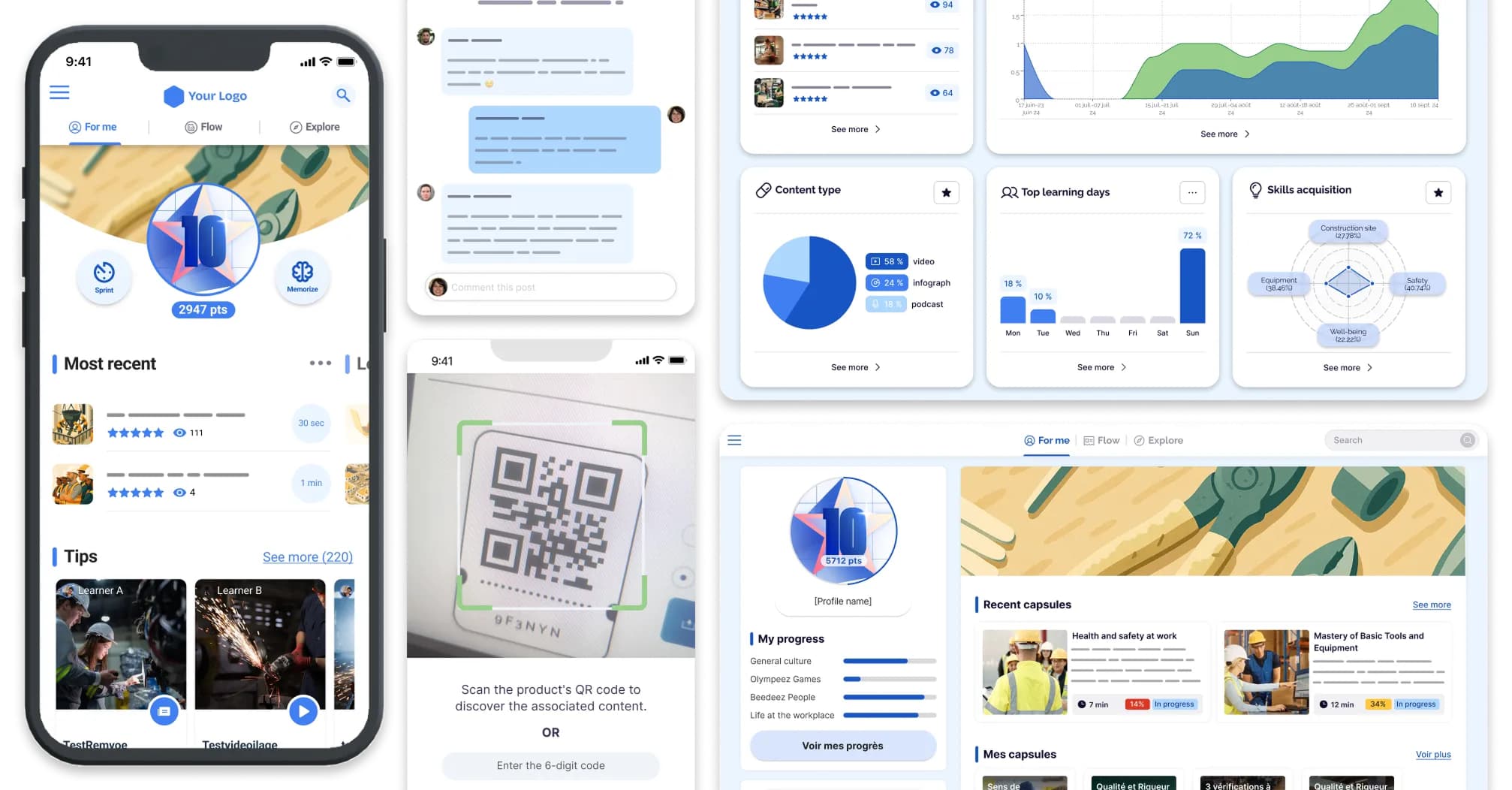Generative AI, with tools like ChatGPT, is generating growing enthusiasm in the field of training. However, despite its potential to transform certain aspects of learning, it will not (yet) replace a structured LMS.
→ While AI is capable of generating content, assisting learners, and customizing pathways, it lacks the educational consistency and traceability that only an LMS can offer.
→ The role of an LMS, as a structured system, remains essential to effectively organize training courses, monitor learners and ensure regulatory compliance.
Decryption
Generative AI shows obvious potential for training, especially in content creation and personalized assistance during learning.
However, despite its undeniable advantages, She will not yet be able to replace a Traditional LMS, for a number of reasons.
Indeed, AI excels in certain specific tasks — content generation, instant responses, course personalization — but the LMS remains essential to structure the entire learning process. It not only makes it possible to organize the training modules in a coherent manner, but also to precisely monitor the progress of each learner, to keep their history, and to analyze their evolution over time.
Here are the major points of distinction:
- AI can generate content quickly, but does not provide the pedagogical coherence necessary for certifying training.
- A structured LMS allows a clear organization of courses, guaranteeing prerequisites, modules and evaluations.
- AI is not keeping up with learner engagement and is not capable of providing in-depth analytics or ensuring compliance.
So the real question is to understand How can these two tools become complementary to offer an optimized learning experience, while respecting legal and educational constraints.
What generative AI already makes it possible to do in training
Generative AI, and in particular tools like ChatGPT, has already begun to transform some uses into training. Its main asset? Its ability to produce content on demand and personalize the experience.
Creation of educational content : review sheets, quizzes, case studies, everything can be generated on the fly according to a theme or a level of difficulty.
Instant answers to questions : in teaching assistant mode, AI can support the learner in his career and help him to resolve his misunderstandings, in real time.
Personalized itinerary suggestions : AI can offer exercises adapted to the needs expressed, or reorganize the content according to what has been learned.
Saves time for designers : it automates certain time-consuming stages of content creation, freeing up time for tasks with higher added value.
But while impressive in its speed and flexibility, AI quickly shows its limits when it comes to structuring a coherent training strategy.
The limits of generative AI to structure a training strategy
Despite its capabilities, AI does not (yet) replace a complete educational system. Why? Because it is not designed to structure long-term learning or to meet the operational requirements of businesses.
No pedagogical structure : AI works by ad hoc generation of content, without the logic of progression, validation of achievements or clear educational objectives.
No traceability : it does not make it possible to monitor the commitment, results or paths of learners. It's impossible to know who did what, or to get actionable reports.
Risk of errors : hallucinations, approximations, unverified sources... AI can produce erroneous content without realizing it.
No management of roles or legal obligations : AI does not know how to manage user profiles, access rights or regulatory constraints related to vocational training.
Clearly, AI can enrich a strategy, but it cannot, by itself, organize it or make it reliable.
What a structured LMS brings that an AI alone cannot (yet) offer
An LMS is not just a content repository platform. It is a real system for organizing, monitoring and managing training — and this is what makes it an irreplaceable tool.
Structuring the courses : with an LMS, you build logical modules, with prerequisites, sequences, evaluations and certifications. Each stage is designed to guarantee a gradual increase in skills.
Monitoring and reporting : thanks to dashboards, you have a clear vision of progress, bottlenecks or completion rates. You can manage training at the level of a team or an entire company.
Traceability and compliance : proof of training, auditability, career history... The LMS guarantees that your legal obligations are respected.
Collective experience : forums, comments, learning groups... The LMS also creates links between learners, promotes the exchange of best practices and group dynamics.
In summary, the LMS sets the framework, ensures reliability and structures progress. AI can be a great complementary tool, but it doesn't replace this backbone.
Towards a strategic complementarity between AI and LMS
Rather than opposing them, the future of training depends on a intelligent collaboration between AI and LMS. Everyone has a role to play in offering an experience that is both fluid, effective and engaging.
AI as a personalization engine : integrated into an LMS, it can offer content or courses according to the learner's profile, needs, or previous results.
Creative support for trainers : a module generated via ChatGPT or a similar AI can be reworked, structured and integrated directly into the LMS journey, without starting from scratch.
Performance accelerator : AI boosts creativity, reduces design time, and improves responsiveness. But It is the LMS that guarantees coherence and global management.
One does not replace the other, but together, they reinforce the educational impact and the quality of the user experience.
What the numbers say: IA vs LMS, a very supervised match
Here are some insights that set the record straight about the role supplemental generative AI and LMS in vocational training systems:
87% e-learning managers consider AI to be a A great source of content creation, but not a structuring tool of course. (Source: Fosway Group, 2024)
Only 12% of companies surveyed have deployed generative AI without integrating it into an LMS or an existing solution.
Conclusion: AI alone is not enough to frame the entire process.
In regulated sectors (health, banking, industry), the traceability of training courses is mandatory. However, 0% consumer AIs offer a compliant proof system for audits.
Only one Structured LMS can meet these requirements.
AI at Beedeez, a tool at the service of pedagogy
At Beedeez, we did not integrate AI out of fashion. We use it because we believe in its added value for trainers as well as for learners.
On the designer side, our AI facilitates the creation of courses by generating customizable training plans, adapted to your objectives and your audiences.
Learner side, intelligent semantic search makes it easier to find the right content. An AI assistant is also available to answer questions and encourage exploration.
Secure and reliable, our AI relies on content validation mechanisms to guarantee useful information adapted to professional training.
→ AI at Beedeez is a real educational accelerator within a structured platform, designed to sustainably support the development of skills.
FAQS
- Can AI create comprehensive training modules? No, AI can generate content, but it lacks the ability to structure a complete and coherent journey, including prerequisites and evaluations.
- Can an LMS work without AI? Yes, an LMS can be used alone, but AI can enrich it by facilitating the personalization of courses and the creation of content.
- Can generative AI track learner performance? No, AI alone does not make it possible to monitor engagement or measure learners' achievements. This requires a structured system, like an LMS.
- Can AI replace a trainer? No, although AI can offer support, it does not replace the human intervention necessary for educational support, needs analysis or personalized exchanges.
- What sectors can benefit from an AI + LMS approach? All sectors that require continuing education and compliance management, including health, finance, security, and regulated industries.




